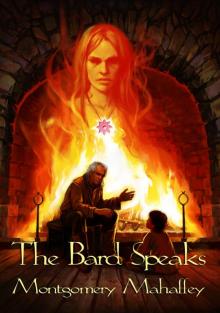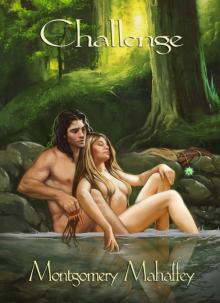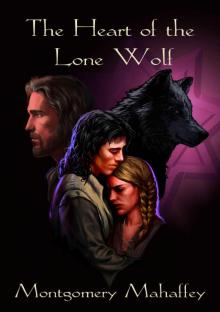- Home
- Montgomery Mahaffey
The Heart of the Lone Wolf
The Heart of the Lone Wolf Read online
All Rights Reserved
Copyright 2014 by Montgomery Mahaffey
Cover Illustration by BANE
Copyright 2012
PART IV
Chapter one
Five months later…
Rot was preferable to nothing. The Wolf whimpered from his churning stomach and swallowed his retch. He blew snuf fles through his nose. He was lying on his side.
The trees hid him from the men working the fields. But he wasn’t so deep in the woods he’d miss the sunrise. Blinking slowly, he pulled himself up and shook his head to stay awake.
He never liked to fall asleep before daybreak. The chaos of his memories tore him apart. While he slept, the joyous times in his life as a man intertwined with the misery of being trapped in the body of a wolf. He never knew whether to relax in the sweet dreams of his boyhood, reliving those times when his grandfather taught him to forage, or force himself awake from a nightmare of digging amongst stench and compost, an animal desperate for something to eat. In his sleep, he would be a youth cooking for their guests while the Bard told stories; then a pack of wolves bared their teeth and growled at him when he came near. He would be a young man traveling with a caravan of nomads; then he fled from men raising their ri fles to shoot at him, terror making his limbs nimble.
Dawn was breathtaking in the past week. The morning colors were always the most vivid in the peak of spring. Those precious minutes of watching the darkness dissipate into shades of pink, orange, and amber violet gave him the only peace the Wolf would know that day. Only after the sun came up would he allow himself to sleep. Under a bright sky, the torment of his dreams caused him less anguish.
The sequence of dreams always ended with his grandfather, and he came to the Bard as the Wolf. The old man looked at him with sorrow, while the Wolf was always angry when they met. He was also ashamed for being such a fool, but he still felt betrayed by his grandfather. If the Bard hadn’t propelled into those dreams, he would have left the girl behind in No Man’s Land.
“Why?” the Wolf asked, always the same question every night.
“Just follow your heart,” the Bard replied. “And you’ll be all right.”
“How can I do that when I don’t have it with me?”
“Your heart’s always a part of you.”
His grandfather never elaborated and the Wolf would awaken to his throbbing hollow space. His limbs ached as if he’d been running for hours, and there was often a rank taste in the back of his mouth.
Whenever Ella Bandita came to mind, he pushed the image away. Thinking about her made the vile course through his veins, and reminded the Wolf that he couldn’t change his predicament. Every night he howled to the moon, and every morning his first instinct was to stand on two legs. But he could never keep his balance and dropped four paws to the ground.
His lupine form remained a stranger to him. He didn’t like his fur and being unable to touch his skin frustrated him. He felt his potential for strength, but didn’t know how to use it. Subtle noises distracted him and his sense of smell was torture. Knowing prey was around him always and being unable to hunt it down nearly drove him to madness on some days. He had speed, yet still couldn’t catch the smaller animals. His instincts were both natural and bizarre, and the Wolf was left to scavenge in the compost piles to stay alive. He was amazed he could keep the refuse down. The thought of being this wretched creature for the rest of his life filled him with despair. He thought about the village all the time; the Bard’s cabin a haven now beyond his reach.
The Wolf often fell asleep hoping the agony of his dreams would kill him. But he always came to in the late afternoon, and his waking hours were much like those before had been. On this morning, the Wolf gazed into the rising sun as long as he could keep his eyes open, pleading for anything to change.
He fell into the blackness of sleep without dreams, waking up to heavy limbs and a reluctance to move. He knew something was different when he opened his eyes and yawned. He had a sense of wellbeing that had been missing for a long time. Finally, his fluttering ears brought him to the recognition of music. Somebody was playing a fiddle nearby.
His sluggishness immediately gone, he sat up and listened. He hadn’t the pleasure of music in far too long. The tune was cheerful, the notes ringing through the trees behind him. He followed the song where the forest gave way to an open meadow. He smelled prey before he saw the large flock of sheep roaming through the grass and drinking from the pond. His lips shimmied along his teeth and his nostrils quivered, the instinct to stalk compelling. There were so many sheep. He could easily catch one. But the trill of the fiddle was more tempting, guiding the Wolf to the player, who was clearly the Shepherd of this flock.
He was near the trees at the crest of the hill. He swung his bow across the strings, and danced a whirlwind jig in the rhythm of masculine grace. He was very tall, taller than the Wanderer had been. His black hair had threads of silver and fell in waves past his shoulders. His beard was thick, with more silver strands than his mane. In the brief moments the Shepherd spun in the Wolf’s direction, he saw deep lines etched across his brow and around his eyes. But his deeply tanned skin was taut against his chiseled features. Although far into his mature years, the Shepherd moved with the agility of a man half his age.
With his head bent towards his fiddle and engrossed in his playing, he was blind to the Wolf until the distressed noises of his flock made him look up. The Shepherd saw him immediately, dropping his fiddle and bow for a ri fle the Wolf hadn’t noticed on his approach. He collapsed to the ground and squeezed his eyes shut.
“Please don’t kill me!” the Wolf begged, his voice raspy after months of disuse.
“On my soul, I swear I don’t want your sheep!”
He braced himself for the clap of gunshot, but nothing happened. When he dared to look, the Wolf found the Shepherd with ri fle in hand, but the barrel pointed to the ground. The Shepherd stared at the Wolf with the clearest green eyes he’d ever seen.
“Did you just speak to me?”
The Shepherd’s voice was a soothing mellow tenor that put the Wolf at ease. He recognized him as the kind of man he most loved to travel with. The Wolf pushed himself off the ground, but as his head and shoulders rose, the Shepherd’s face tightened and he brought his gun to waist level, his finger on the trigger. The Wolf lowered his back haunches.
“I don’t mean you any harm,” he said. “I just wanted to listen to the music.”
The Shepherd didn’t answer right away. His regard swept over the Wolf, the lines deepening between his brows.
“I’ve never seen a wolf with black eyes before,” he said.
“Neither have I.”
The Shepherd smiled. One of his front teeth overlapped the other, making the expression of friendliness even more endearing. He bent down and traded the ri fle for his fiddle and bow.
“I have an idea,” the Shepherd said. “I’ll keep playing while you tell me how you came to be a talking wolf.”
So the Wolf did. The Shepherd made a satisfying listener. Even while playing, his gaze stayed on the Wolf and he never interrupted the flow of the story. Sometimes the Wolf grew uneasy when the Shepherd’s face clouded over or he frowned. But the Wolf knew the Shepherd heard him and his relief was such that he couldn’t hold back. Once he finished the tale of losing his heart, he couldn’t stop. He told the Shepherd about his parents’ murder, his terror of being alone after his grandfather died, and the isolation of being a man inside a wolf. As he talked, the compassion in those clear green eyes made the throbbing in his hollow disappear.
By the time he finished, day had become night. The Shepherd stopped playing the same moment the Wolf fell
silent. He was exhausted. Although he knew it was time to bid farewell, his head weighed heavy and the Wolf drifted into a dreamtime harmony.
For the first time in months, he was refreshed when he woke up the next morning.
He stretched his limbs and yawned, the smell of charring meat stirring up his hunger. He was surprised and pleased when the Shepherd set a plate of overcooked squirrel before him.
“Sorry it’s burned. I probably should have left it raw because I’m not much of a cook.”
“Well, I can help you with that,” the Wolf replied. “Or at least I could have.”
“You can still talk me through it. That is, if you want to.”
That was all the invitation the Wolf needed. He fell into the Shepherd’s routine as if he’d been part of his flock for years. He helped gather the sheep, running after those that roamed too far. They also worked well together with hunting. The Wolf honed his sense of smell and hearing to track animals and chase them out of hiding toward the Shepherd waiting with his ri fle. As he promised, the Wolf taught him how to cook, then how to forage. The Shepherd was lavish in his praise, swearing he’d never eaten so well in his life as he had since the Wolf joined him.
The Wolf insisted the honor was his, and he meant it. Nobody since his
grandfather inspired his awe until now. The grace in which he was received was the first of many times the Wolf witnessed the Shepherd’s kindness to others. This man treated others with a dignity that was rare. He was stunned when he realized his new friend had a need for solitude, often distancing himself to be alone for a few hours. The Shepherd possessed a serenity the Wolf had never seen in a human being. This was a quality he attributed to the divinity of a master. The Wolf was certain because his hollow stopped throbbing from the time he joined his flock, and he hadn’t suffered the vile of rage and hatred since the night he unburdened his soul. The Shepherd was amused by the Wolf’s exalted view of him.
“I think gratitude may be clouding your judgment,” he said. “I’m no more than a creature of my way of life.”
“I’ve met many shepherds in my travels. And I’ve never met any like you.”
His friend shrugged and the Wolf dropped the subject. But the more he came to know the Shepherd, the more he admired him. He was more than a touch envious when he discovered the Shepherd was a learned man, able to read, write, and do basic math. He could also play the violin, which he swapped for his fiddle. When he wasn’t playing music, the Shepherd loved to draw. Parchment and pencils were his only luxuries and he indulged every day. He sketched memories from his past as well as images from the present, his eyes glazed over and the pencil captured a cherished moment with sharp realism.
“How did you learn all this?” the Wolf asked one morning while his friend drew him.
“A retired governess was on my route about twenty years ago.”
The Shepherd sounded vague when he answered, his eyes shifting between the Wolf and the paper, brushing his pencil without rest.
“Winters were mild in her village. Since travel was arduous, I often stayed as long as I could. One day, she suggested we barter lessons and lodging for sheep. So I stayed with her every winter and gave her three sheep when I left. After ten years, I learned everything I wanted to know and she had a nice flock of her own.”
The Shepherd trailed off, making the final strokes to his sketch and displaying his work with a flourish.
“So how do you like it?”
The Wolf stared at the likeness and wondered how that could be him. The animal in the drawing seemed so powerful, lying upright with forelegs stretched out. The details were exquisite, the mass of black on black vivid. Even the eyes could be distinguished from the fur.
“Do I really look like this?” he whispered.
“Of course you do.”
“You are such a good man,” the Wolf blurted. “Why didn’t you ever marry?”
The Shepherd grew still, peering at him for a moment before he spoke.
“What a strange question you ask. This is no life for a woman and children.”
“That’s absurd. I met families of herders, three or four generations that traveled all year.”
“I have over a hundred sheep,” the Shepherd replied. “That’s all the family I need.”
“That’s not the same as a wife and little ones. Have you never fallen in love?”
Again the Shepherd didn’t answer right away, frowning and looking intently at the Wolf for a few minutes.
“I have loved once. However, nothing that was destined to last.”
“What’s that supposed to mean?”
The Shepherd would say nothing more; he just held up his hand and turned away.
They became famous in time. They were a curiosity traveling through cities, towns, and villages, this flock with a talking wolf as a sheepdog. The Shepherd gave a brief history of what happened between his friend and Ella Bandita, drawing attention to his eyes to prove the Wolf had once been a man. The Wolf quickly learned to keep his distance during these exchanges. After his first meeting with the Shepherd, he never spoke about Ella Bandita again. Hearing her name stirred up a rage and hatred that the Wolf couldn’t bear. After so many months of anguish, his peace of mind was everything to him.
For nearly three years, he and the Shepherd got on well. Then one day everything changed. Winter was disappearing to make way for spring, the snowmelt leaving the earth soggy with the first greens sprouting through the fields. The Wolf could never resist running through the mud, his paws sinking deeper in the muck with each bound. He glanced at the Shepherd and saw he was in no hurry to gather the flock. His friend leaned against a tree, his clear green eyes looking from them to his parchment, his pencil moving swiftly.
The Wolf continued harassing the sheep, splattering mud on them while diving and weaving amongst the flock. By early afternoon, he knew the Shepherd was ready to move on when his whistle pierced the air. The Wolf changed paces, nipping at their heels to gather the sheep. Air ruf fled through his fur and the sudden breeze was a pleasant surprise. But the light wind distressed the Shepherd. The Wolf heard him shout, then saw him running across the meadow, frantic to catch the sheets whipping through the air before mud and trampling hooves ruined his drawings.
The Wolf sprang towards the flock, his teeth bared. Snarling, he ran in wide circles, chasing the sheep away from the sketches floating to the ground, while the Shepherd hurried to retrieve them. The Wolf held a steady pace, running back and forth and pushing the flock away. One paper hovered close by, and the Wolf kept one eye on it and one eye on the flock. Then it flipped on the tail end of the breeze, fluttering to the ground, and the image halted the Wolf in his tracks.
He closed his eyes and opened them again to make certain his imagination wasn’t taunting him. The sheep were forgotten as the Wolf trailed after the drawing and pinned it to the ground with his paw. A growl rumbled in the back of his throat and fur rose between his shoulders. His hollow space began a violent pounding.
“What troubles you, Wolf?” the Shepherd asked, coming up with sketches in hand.
He didn’t answer. His gaze was riveted on the picture of a young woman cradling a tiny lamb to her breast. Her eyes were wintry and the lower half of her face was stained dark as were her hands, most likely from blood. The drawing was of Ella Bandita.
The Shepherd took hold of the parchment, but the Wolf refused to step off. He marveled that those treacherous eyes could be so clear, his gaze seeming as pure as ever.
“I take it this must be your Ella Bandita,” the Shepherd said, after a moment’s pause.
“Are you going to pretend you didn’t know that?”
“I beg your pardon,” the Shepherd said, raising his brows. “But this night was thirty years ago, long before there were any stories about her.”
The Shepherd said nothing more. For once, his calm provoked the Wolf.
“Why didn’t you ever tell me?”
“Because there was no reason to,�
�� the Shepherd replied. “Why would I connect a girl I met when I was nineteen with a predatory seductress thirty years later?”
“I don’t know,” the Wolf grumbled. “But if that’s blood on her face and hands, I would think that would hint of the possibility.”
“I admit I’ve often wondered if this girl and your Ella Bandita were the same. But your suspicion is offensive.”
“You never told me about her,” the Wolf persisted.
“Perhaps I should have. But as I said, this was before the Ella Bandita stories began.”
“Sounds like quite a tale. I’d be honored to hear it.”
“If you can act in a courteous manner, then you will.”
The Shepherd spoke with the same dignity that inspired the Wolf’s respect from the day he met him, his tone that of a man with nothing to be ashamed of. His fingers still clutched the drawing, pulling gently until the Wolf let go.
The Wolf told himself he was making more fuss than the situation called for, while his hollow made chaos inside him and ire coursed in his veins again. He tried to console himself that the Shepherd must have a reasonable explanation. But watching his friend gather his sketches and gingerly roll them into his cache made the Wolf wonder how many drawings were of Ella Bandita.
“Are you ready?”
The Wolf nodded and the Shepherd’s story began.
****
The Shepherd held his hand to the sky. Night would come sooner than he liked, the sun only four fingers above the horizon. He squinted against the glare and scanned the valley, lush even in the peak of autumn, many bushes still laden with overripe berries. He counted his flock of ten. He was reassured the sheep remained close instead of roaming the valley on the other side of the river, tracking the newest lamb through moving grass.
It would be foolish to keep going. There was plenty for himself and his flock. But he couldn’t shake the unease plaguing him more as the day wore on. How could he have spent the better part of the day in a village he’d never passed through? He never did that, nor did he ignore his instincts when something didn’t feel right.

 The Bard Speaks
The Bard Speaks Birthing Ella Bandita
Birthing Ella Bandita Challenge
Challenge The Heart of the Lone Wolf
The Heart of the Lone Wolf